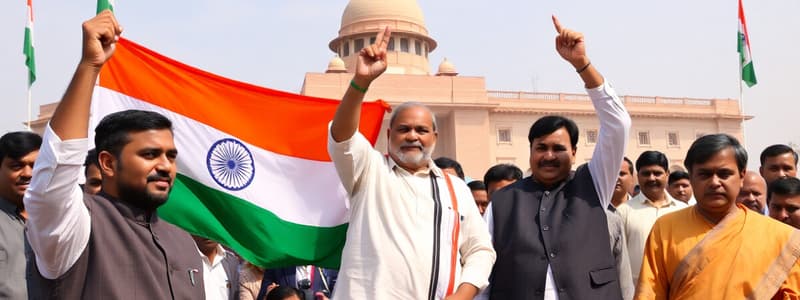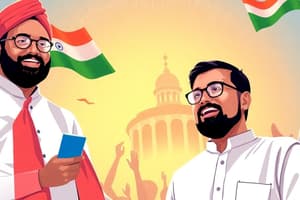Podcast
Questions and Answers
What was one major challenge faced by newly independent countries regarding democracy?
What was one major challenge faced by newly independent countries regarding democracy?
- Maintaining national unity (correct)
- Establishing a multi-party system
- Creating a federal government
- Promoting economic growth
India's leaders viewed politics primarily as a way to create problems within society.
India's leaders viewed politics primarily as a way to create problems within society.
False (B)
Who was the first Chief Election Commissioner of India?
Who was the first Chief Election Commissioner of India?
Sukumar Sen
The Indian Constitution came into effect on __________.
The Indian Constitution came into effect on __________.
Match the following challenges faced by the Election Commission with their descriptions:
Match the following challenges faced by the Election Commission with their descriptions:
What method did Indian leaders choose to resolve the conflicting aspirations of different societal groups?
What method did Indian leaders choose to resolve the conflicting aspirations of different societal groups?
Fair elections are considered easy to conduct in a large country like India.
Fair elections are considered easy to conduct in a large country like India.
What important institution was established in January 1950 to oversee elections in India?
What important institution was established in January 1950 to oversee elections in India?
Who was the founder of the Bharatiya Jana Sangh?
Who was the founder of the Bharatiya Jana Sangh?
The Communist Party of India was primarily religious and traditional.
The Communist Party of India was primarily religious and traditional.
What was observed during the first draft of the electoral rolls?
What was observed during the first draft of the electoral rolls?
Name one of the notable leaders of the Communist Party of India.
Name one of the notable leaders of the Communist Party of India.
The Election Commission accepted the observation of missing names in the electoral rolls.
The Election Commission accepted the observation of missing names in the electoral rolls.
Who founded the Socialist Party in India?
Who founded the Socialist Party in India?
The Bharatiya Jana Sangh advocated for the concept of one country, one ______, and one nation.
The Bharatiya Jana Sangh advocated for the concept of one country, one ______, and one nation.
Which political party split into the CPI and CPI(Marxist) in 1964?
Which political party split into the CPI and CPI(Marxist) in 1964?
The ideology of the Socialist Party criticized ______.
The ideology of the Socialist Party criticized ______.
Match the following political parties with their characteristics:
Match the following political parties with their characteristics:
Match the following parties with their origins:
Match the following parties with their origins:
What was one effect of having multiple political parties during the era of one-party dominance?
What was one effect of having multiple political parties during the era of one-party dominance?
The PRI in Mexico was founded as a symbol of authoritarian rule.
The PRI in Mexico was founded as a symbol of authoritarian rule.
What characterizes the Congress as a coalition?
What characterizes the Congress as a coalition?
In which decade did the Communist Party of India experience a major split?
In which decade did the Communist Party of India experience a major split?
The leaders of the opposition parties had a mutual respect relationship with Congress leaders initially.
The leaders of the opposition parties had a mutual respect relationship with Congress leaders initially.
Name one leader from the socialist parties.
Name one leader from the socialist parties.
Factions within Congress were seen as a weakness of the party.
Factions within Congress were seen as a weakness of the party.
Name one factor that contributed to Congress's dominance in the first three general elections.
Name one factor that contributed to Congress's dominance in the first three general elections.
The Congress party won _____ of the 489 seats in the first Lok Sabha.
The Congress party won _____ of the 489 seats in the first Lok Sabha.
Match the following aspects with their characteristics:
Match the following aspects with their characteristics:
Which of the following was a significant outcome of the emergence of opposition parties?
Which of the following was a significant outcome of the emergence of opposition parties?
The Communist Party of India was the second highest party in terms of seats won in the first Lok Sabha.
The Communist Party of India was the second highest party in terms of seats won in the first Lok Sabha.
What did the coalition nature of Congress allow parties to do during the freedom struggle?
What did the coalition nature of Congress allow parties to do during the freedom struggle?
In which states did the Congress not win a majority of seats in the state elections?
In which states did the Congress not win a majority of seats in the state elections?
Jawaharlal Nehru became the Prime Minister after the second general election.
Jawaharlal Nehru became the Prime Minister after the second general election.
What percentage of total votes did the Congress receive in 1952?
What percentage of total votes did the Congress receive in 1952?
In the second general election held in ________, the Congress maintained its position by winning three-fourths of the seats.
In the second general election held in ________, the Congress maintained its position by winning three-fourths of the seats.
Which party was the second largest in terms of votes in the elections mentioned?
Which party was the second largest in terms of votes in the elections mentioned?
Match the following countries with their description of political dominance:
Match the following countries with their description of political dominance:
The general election of 1952 was postponed three times before being held.
The general election of 1952 was postponed three times before being held.
What was the average number of candidates per seat in the general elections?
What was the average number of candidates per seat in the general elections?
Flashcards
Delimitation of electoral constituencies
Delimitation of electoral constituencies
The process of dividing a country into electoral constituencies based on population, ensuring fair representation.
Electoral Rolls
Electoral Rolls
The official list of registered voters in an election, crucial for conducting fair and transparent elections.
Election Commission of India
Election Commission of India
The body established in India in January 1950 to conduct and oversee elections, ensuring fair and free elections.
One-Party Dominance
One-Party Dominance
Signup and view all the flashcards
Challenge of Building Democracy in India
Challenge of Building Democracy in India
Signup and view all the flashcards
Politics as a tool for solving problems
Politics as a tool for solving problems
Signup and view all the flashcards
Resolving conflicting aspirations through democracy
Resolving conflicting aspirations through democracy
Signup and view all the flashcards
Deciding and pursuing public interest
Deciding and pursuing public interest
Signup and view all the flashcards
Electoral Rolls Omission
Electoral Rolls Omission
Signup and view all the flashcards
Congress Party Check & Balance
Congress Party Check & Balance
Signup and view all the flashcards
Opposition Role in Democracy
Opposition Role in Democracy
Signup and view all the flashcards
Early Years of Opposition Collaboration
Early Years of Opposition Collaboration
Signup and view all the flashcards
Socialist Party Origin
Socialist Party Origin
Signup and view all the flashcards
Socialist Party Splits
Socialist Party Splits
Signup and view all the flashcards
Leaders of the Socialist Party
Leaders of the Socialist Party
Signup and view all the flashcards
Congress Dominance Reasons
Congress Dominance Reasons
Signup and view all the flashcards
What was the Bharatiya Jana Sangh and its key beliefs?
What was the Bharatiya Jana Sangh and its key beliefs?
Signup and view all the flashcards
How did the Communist Party of India (CPI) evolve in its early years?
How did the Communist Party of India (CPI) evolve in its early years?
Signup and view all the flashcards
What led to the division within the Communist Party of India?
What led to the division within the Communist Party of India?
Signup and view all the flashcards
Describe the PRI and its origins in Mexico.
Describe the PRI and its origins in Mexico.
Signup and view all the flashcards
How did the PRI's rule affect Mexican democracy?
How did the PRI's rule affect Mexican democracy?
Signup and view all the flashcards
Factions within a political party
Factions within a political party
Signup and view all the flashcards
Multi-party democracy
Multi-party democracy
Signup and view all the flashcards
Balancing political interests
Balancing political interests
Signup and view all the flashcards
Dominant Political Party
Dominant Political Party
Signup and view all the flashcards
One-Party State
One-Party State
Signup and view all the flashcards
First General Election in India (1952)
First General Election in India (1952)
Signup and view all the flashcards
Indian Congress Dominance vs. Other One-Party Systems
Indian Congress Dominance vs. Other One-Party Systems
Signup and view all the flashcards
Kerala's Coalition Government (1957)
Kerala's Coalition Government (1957)
Signup and view all the flashcards
Artificial Boost of Congress Victory
Artificial Boost of Congress Victory
Signup and view all the flashcards
Study Notes
Era of One-Party Dominance
- Independent India faced significant challenges establishing democracy, as many countries experienced non-democratic governance after independence.
- India's leaders prioritized democracy and politics as problem-solving tools, not problem-creators.
- Diverse groups within Indian society were accommodated through democratic politics.
- The Congress party's success stemmed from its strong organizational network, its roots in the national movement, and its inclusive nature representing various social groups.
- The party's ability to encompass differing viewpoints contributed to its dominance.
Setting Up of Election Commission
- India's constitution took effect in 1950, necessitating the immediate establishment of an election commission.
- Early challenges in Indian elections included significant difficulties in carrying out fair elections given the vast size of the country.
- Establishing electoral rolls was a crucial but complex task, encountering issues like underrepresentation of women.
- The Election Commission recommended revisions to address data inaccuracies and ensure fairer electoral representation.
Major Political Parties of India
- The Socialist Party was formed in 1948, emphasizing democratic socialism, critiquing capitalism.
- Key founders and leaders of the Socialist party included Acharya Narendra Dev, Jayaprakash Narayan, AK Gopalan, SA Dange, EMS Namboodiripad, PC Joshi, and Ajay Ghosh and P Sundarayya.
- The Bharatiya Jana Sangh was founded in 1951, with ideologies of a unified India and a call for nuclear development.
- Leaders of the Bhartiya Jana Sangh included Shyama Prasad Mukherjee, Deen Dayal Upadhyaya, and Balraj Madhok.
- The Communist Party of India also played a part in Indian politics
- The Communist Party of India was primarily secular, modern, and authoritarian but faced schisms related to ideological differences.
Congress Dominance in the First Three General Elections
- Jawaharlal Nehru's leadership and charismatic campaign played a key role in raising Congress's popularity and winning significant support amongst the public.
- The Congress Party won a majority of seats and held dominant positions in national and state governments for the initial three general elections.
- The Congress's victory was partially facilitated by electoral systems which did not always reflect voter preferences.
- The Congress party's dominance in India was a complex phenomenon that was characterized by extensive organization, charismatic leadership, and the inclusion of diverse social groups.
- Other parties also existed but had less organized approaches and lacked popular leaders.
- The dominance was maintained in subsequent elections.
Studying That Suits You
Use AI to generate personalized quizzes and flashcards to suit your learning preferences.
Related Documents
Description
Explore the challenges and successes of establishing democracy in India post-independence. This quiz covers the era of one-party dominance and the initial setup of the Election Commission, focusing on how various social groups were accommodated through democratic practices.




